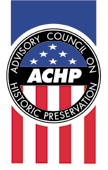 About ACHP
About ACHP ACHP News
National Historic
Preservation
Program
Working with
Section 106
Federal, State, & Tribal Programs
Training & Education
Publications
Search
Home
International Centre for the Study of the Preservation and Restoration of Cultural Property (ICCROM)
The International Centre for the Study of the Preservation and the Restoration of Cultural Property (ICCROM) is an international, intergovernmental organization established in 1959. Created by UNESCO, ICCROM is an independent body currently consisting of 101 member nations and various associate institutions. With headquarters in the Ospizio di San Michele, Rome, it serves as a research and training center and as a clearinghouse for the exchange of conservation information among specialists from all nations.
Concerned with the scientific and technical problems of cultural conservation, ICCROM collects and circulates information, institutes and coordinates research, and assists in training researchers and technicians and in raising the standard of restoration work. ICCROM has established itself as a leading international preservation institution.
The principal responsibility for guiding United States membership in ICCROM rests with the Advisory Council on Historic Preservation. The National Historic Preservation Act of 1966 was amended on May 9, 1970 [84 stat.204] to allow membership in ICCROM, and formal affiliations became effective on January 20, 1971.
ICCROM Programs
In fulfilling its responsibilities to assist in training research workers and technicians, ICCROM offers a wide range of training courses at its headquarters in Rome and elsewhere. These courses focus on the conservation of sites, buildings, and artifacts of cultural and historical importance. Course participants, who include architects, urban planners, archeologists, art historians, engineers, conservators, scientists, archivists, librarians, and museum curators, are carefully selected so that they are actively engaged in conservation work and training in their own countries whenever possible.
ACHP members hold a jury to rank U.S. citizens' applications for two of ICCROM's long courses open to U.S. citizens, Architectural Conservation and International Workshop on Integrated Territorial and Urban Conservation, held in Rome.
Please note that the application periods for both courses are currently closed. Upcoming schedules are posted here when we receive such information from ICCROM.
Architectural Conservation (ARC)
Held for 12 to 14 weeks, ARC offers a platform for exchanging information and experience, discussing state-of-the-art approaches and trends through a postgraduate refresher forum. Topics include issues and concerns of architectural heritage conservation and subjects of current debate and research, with a stress on principles, methodologies, science, ethics, and an international, interdisciplinary approach.
The course also covers issues emerging as new responsibilities and competencies of the profession. The course, composed of modules, is open to either full- or short-term participants. Candidates for the course are mid-career professionals involved in training or practice, including architects, civil engineers, archeologists, and art historians, and who are potential disseminators of knowledge and skills and are influential on national or regional developments relevant to the profession and heritage concerned.
International Workshop on Integrated Territorial
and Urban Conservation (ITUC)
ITUC, a six-and-a-half-week course, integrates participants’ contributions and experience to guide them in developing syntheses around appropriate responses to contemporary issues and challenges. The workshop is designed to equip participants with skills in human negotiation, facilitation, conflict resolution, and communication that the workshop views as the keys to effective integrated management of historic areas. The target group for ITUC includes planners, architects, engineers, historians, archeologists, geographers, urban designers, landscape architects, economists, lawyers, sociologists, administrators, trainers/educators, and others whose decisions have a large impact on heritage values.
For More Information
Updated
June 5, 2002